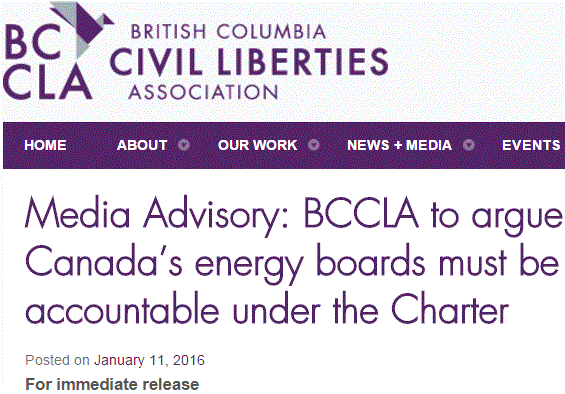BCCLA to argue Canada’s energy boards must be accountable under the Charter Media Alert by BC Civil Liberties Association, January 11, 2016
Ottawa – Tomorrow, January 12, 2016, the BCCLA will make oral submissions to the Supreme Court of Canada in Jessica Ernst v. Alberta Energy Regulator. At issue in this case is whether a provincial government can pass legislation making itself immune from claims for damages under the Canadian Charter of Rights and Freedoms. The BCCLA is intervening at the Supreme Court of Canada to argue that governments cannot block individuals from seeking a remedy for violations of their fundamental rights and freedoms. We will argue that nobody should be unfairly silenced by Canada’s energy boards, and that those boards must be held accountable when they violate people’s Charter rights.
The case arises out of an Alberta landowner’s opposition to a fracking operation run by EnCana that she claims has polluted her groundwater supply with dangerous chemicals. She took her concerns to the Alberta Energy Regulator, the government agency responsible for enforcing laws and regulations to protect groundwater from industry-related contamination. She also raised her concerns publicly and in the media. The Regulator then told Ms. Ernst that they would not accept further correspondence from her unless she agreed to raise her concerns only with the Regulator, and not publicly through the media or with other citizens. Her subsequent letters were met with silence and returned unopened.
The landowner, Jessica Ernst, sued EnCana, the Alberta government, and the Regulator alleging that EnCana had been negligent in its fracking operation and the Alberta government and the Regulator had been negligent in the way they investigated and enforced the law. She also alleged that the Regulator had violated her right to freedom of expression, protected by section 2(b) of the Canadian Charter of Rights and Freedoms, through its refusal to accept her complaints and pressure to cease her public advocacy.
The Alberta Energy Resources Conservation Act contains a clause called a “protection from action” clause. The Alberta courts held that this clause makes the Regulator immune from legal claims for damages under the Charter. The BCCLA will argue that this cannot be correct. The Charter is the supreme law of Canada. It guarantees that anyone whose rights or freedoms have been infringed or denied may apply to the courts for a remedy the court considers appropriate and just in the circumstances. In our view, depriving the courts of their ability to determine an appropriate and just remedy when someone’s Charter rights have been denied violates a fundamental principle of our legal order: that where there is a right, there must be a remedy.
The BCCLA is represented in this case by Ryan Dalziel and Emily Lapper of Bull, Housser & Tupper LLP. [Emphasis added]
Our argument is available here.
What: Supreme Court of Canada will hear oral arguments in the Jessica Ernst v. Alberta Energy Regulator case.
When: Oral arguments before the court begin on Tuesday, January 12 at 6:30 am PT/ 9:30 am ET.
Where: Supreme Court of Canada (Ottawa, Ontario)
Who: BCCLA representatives available for comment

